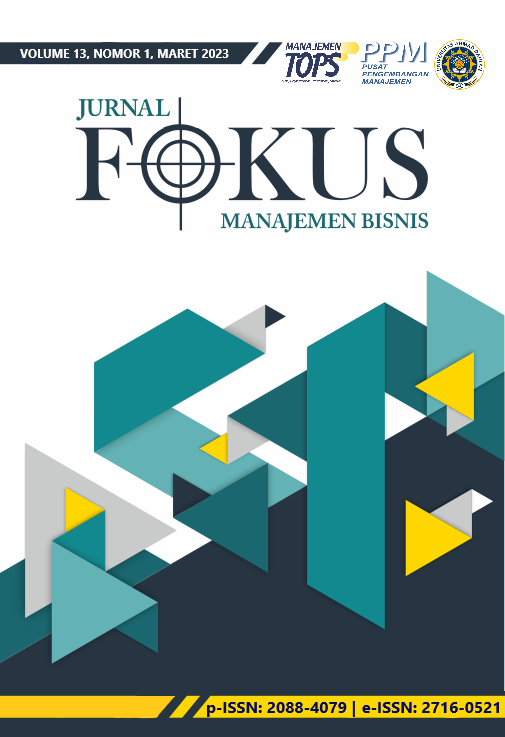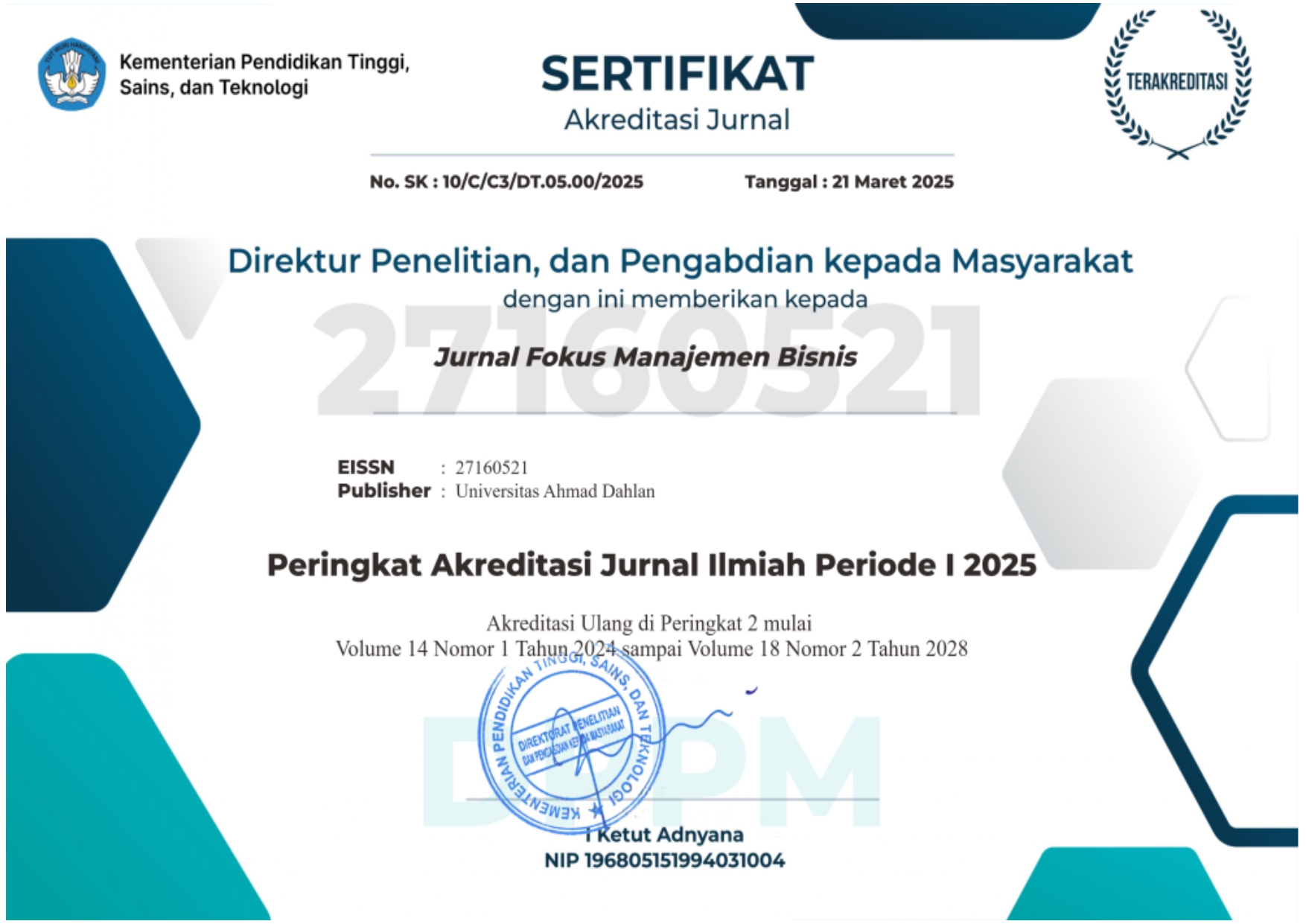PERAN BUDAYA ORGANISASI DAN MOTIVASI INDIVIDU PADA PRAKTIK BERBAGI PENGETAHUAN
DOI:
https://doi.org/10.12928/fokus.v13i1.7669Abstract
Batik is a traditional cloth of Indonesia made by writing or waxing it on the cloth. Information related to batik products will be very crucial because this product has been acknowledged as World cultural heritage by UNESCO. This study aims to examine the influence of culture and motivation on the practice of sharing knowledge about batik. The object of this research was Batik artisans and entrepreneurs in Yogyakarta. The number of samples used was 237 respondents with a purposive sampling technique. The data were analyzed by statistical testing using the SEM test with the AMOS program. The results showed that organizational culture positively influences the practice of sharing knowledge. Furthermore, organizational culture has a positive role in motivating batik artisans and entrepreneurs. The following finding is that intrinsic motivation influences someone to share knowledge, while extrinsic motivation does not influence batik artisans and entrepreneurs to carry out knowledge-sharing activities.
References
Adeinat, I. M., & Abdulfatah, F. H. (2019). Organizational Culture And Knowledge Management Processes: Case Study In A Public University. VINE Journal of Information and Knowledge Management Systems, 49(1), 35–53. https://doi.org/10.1108/VJIKMS-05-2018-0041
Afshari, L., Nasab, A. H., & Dickson, G. (2020). Organizational Culture, Social Capital, And Knowledge Management: An Integrated Model. International Journal of Knowledge Management, 16(2), 52–66. https://doi.org/10.4018/IJKM.2020040104
Al-Musadieq, M., Nurjannah, N., Raharjo, K., Solimun, S., & Achmad Rinaldo Fernandes, A. (2018). The Mediating Effect Of Work Motivation On The Influence Of Job Design And Organizational Culture Against HR Performance. Journal of Management Development, 37(6), 452–469. https://doi.org/10.1108/JMD-07-2017-0239
Al-Sada, M., Al-Esmael, B., & Faisal, M. N. (2017). Influence Of Organizational Culture And Leadership Style On Employee Satisfaction, Commitment And Motivation In The Educational Sector In Qatar. EuroMed Journal of Business, 12(2), 163–188. https://doi.org/10.1108/EMJB-02-2016-0003
Allameh, S. M. (2018). Antecedents And Consequences Of Intellectual Capital: The Role Of Social Capital, Knowledge Sharing And Innovation. Journal of Intellectual Capital, 19(5), 858–874. https://doi.org/10.1108/JIC-05-2017-0068
Andreeva, T., & Sergeeva, A. (2016). The More The Better .. Or Is It? The Contradictory Effects Of HR Practices On Knowledge-Sharing Motivation And Behaviour. Human Resource Management Journal, 26(2), 151–171. https://doi.org/10.1111/1748-8583.12100
Byrne, B. M. (2016). Structural Equation Modeling with Amos (3rd Edition). Routledge. https://doi.org/10.4324/9781315757421
Cadden, T., Marshall, D., & Cao, G. (2013). Opposites Attract: Organisational Culture And Supply Chain Performance. Supply Chain Management, 18(1), 86–103. https://doi.org/10.1108/13598541311293203
Chai, S., Das, S., & Rao, H. (2011). Factors Affecting Bloggers’ Knowledge Sharing: An Investigation Across Gender. Journal of Management Information Systems, 28(3), 309–342. https://doi.org/10.2753/MIS0742-1222280309
Chang, C. L. hsing, & Lin, T. C. (2015). The Role Of Organizational Culture In The Knowledge Management Process. Journal of Knowledge Management, 19(3), 433–455. https://doi.org/10.1108/JKM-08-2014-0353
Chen, H., Baptista Nunes, M., Ragsdell, G., & An, X. (2018). Extrinsic And Intrinsic Motivation For Experience Grounded Tacit Knowledge Sharing In Chinese Software Organisations. Journal of Knowledge Management, 22(2), 478–498. https://doi.org/10.1108/JKM-03-2017-0101
Chong, M. P. M. (2014). Influence Behaviors And Organizational Commitment: A Comparative Study. Leadership and Organization Development Journal, 35(1), 54–78. https://doi.org/10.1108/LODJ-03-2012-0035
Deci, E. L., Olafsen, A. H., & Ryan, R. M. (2017). Self-Determination Theory in Work Organizations: The State of A Science. Annual Review of Organizational Psychology and Organizational Behavior, 4(March), 19–43. https://doi.org/10.1146/annurev-orgpsych-032516-113108
Degbey, W. Y., & Pelto, E. (2021). Customer Knowledge Sharing In Cross-Border Mergers And Acquisitions: The Role Of Customer Motivation And Promise Management. Journal of International Management, 27(4), 100858. https://doi.org/10.1016/j.intman.2021.100858
Durmusoglu, S., Jacobs, M., Nayir, D. Z., Khilji, S., & Wang, X. (2014). The Quasi-Moderating Role Of Organizational Culture In The Relationship Between Rewards And Knowledge Shared And Gained. Journal of Knowledge Management, 18(1), 19–37. https://doi.org/10.1108/JKM-05-2013-0183
Farooq, R. (2018). A Conceptual Model Of Knowledge Sharing. International Journal of Innovation Science, 10(2), 238–260. https://doi.org/10.1108/IJIS-09-2017-0087
Fernandes, A., & Maupa, H. (2018). The Effect Of Organization Culture And Technology On Motivation, Knowledge Asset And Knowledge Management. International Journal of Law and Management, 60(5), 1087–1096. https://doi.org/10.1108/IJLMA-05-2017-0105
Gautam, D. K., & Basnet, D. (2020). Organizational Culture For Training Transfer: The Mediating Role Of Motivation. International Journal of Organizational Analysis, 29(3), 769–787. https://doi.org/10.1108/IJOA-04-2020-2147
Hair, J. F., Black, W. C., Babin, B. J., Anderson, R. E., Black, W. C., & Anderson, R. E. (2019). Multivariate Data Analysis (Eighth Edi). Cengage Learning.
Haque, M., & Thereskova, M. A. (2012). Batik Lukis Basu SD. Kakilangit Kencana.
Hon, A. H. Y., Fung, C. P. Y., & Senbeto, D. L. (2022). Willingness To Share Or Not To Share? Understanding The Motivation Mechanism Of Knowledge Sharing For Hospitality Workforce. Journal of Hospitality Marketing and Management, 31(1), 77–96. https://doi.org/10.1080/19368623.2021.1935384
Hosen, M., Ogbeibu, S., Giridharan, B., Cham, T. H., Lim, W. M., & Paul, J. (2021). Individual Motivation And Social Media Influence On Student Knowledge Sharing And Learning Performance: Evidence From An Emerging Economy. Computers and Education, 172(June 2020), 104262. https://doi.org/10.1016/j.compedu.2021.104262
Hosftede, G., Hosftede, G. J., & Minkov, M. (2010). Cultures and Organizations: Software of the Mind (3rd ed.). McGraw-Hill.
Hwang, Y., Lin, H., & Shin, D. (2018). Knowledge System Commitment And Knowledge Sharing Intention: The Role Of Personal Information Management Motivation. International Journal of Information Management, 39(December 2017), 220–227. https://doi.org/10.1016/j.ijinfomgt.2017.12.009
Jain, A. K. (2015). Volunteerism And Organisational Culture: Relationship To Organizational Commitment And Citizenship Behaviors In India. Cross Cultural Management, 22(1), 116–144. https://doi.org/10.1108/CCM-11-2013-0167
Lee, M. T., Raschke, R. L., & Louis, R. S. (2016). Exploiting Organizational Culture: Configurations For Value Through Knowledge Worker’s Motivation. Journal of Business Research, 69(11), 5442–5447. https://doi.org/10.1016/j.jbusres.2016.04.152
Legault, L. (2020). Intrinsic and Extrinsic Motivation. Encyclopedia of Personality and Individual Differences, 2416–2419. https://doi.org/10.1007/978-3-319-28099-8
Locke, E. A., & Schattke, K. (2019). Intrinsic and Extrinsic Motivation: Time for Expansion and Clarification. Motivation Science, 5(4), 1–33. https://doi.org/10.1037/mot0000116
Mardanov, I. (2020). Intrinsic And Extrinsic Motivation, Organizational Context, Employee Contentment, Job Satisfaction, Performance And Intention To Stay. Evidence-Based HRM, 9(3), 223–240. https://doi.org/10.1108/EBHRM-02-2020-0018
McGregor, L., & Doshi, N. (2015). How Company Culture Shapes Employee Motivation. Harvard Business Review Digital Articles, 11, 1–13. http://ezproxy.csu.edu.au/login?url=http://search.ebscohost.com/login.aspx?direct=true&db=bth&AN=118667611&site=ehost-live
Michailova, S., & Minbaeva, D. B. (2012). Organizational Values And Knowledge Sharing In Multinational Corporations: The Danisco Case. International Business Review, 21(1), 59–70. https://doi.org/10.1016/j.ibusrev.2010.11.006
Nguyen, T. M. (2020). Do Extrinsic Motivation And Organisational Culture Additively Strengthen Intrinsic Motivation In Online Knowledge Sharing?: An Empirical Study. VINE Journal of Information and Knowledge Management Systems, 50(1), 75–93. https://doi.org/10.1108/VJIKMS-02-2019-0019
Nguyen, T. M., Nham, T. P., Froese, F. J., & Malik, A. (2019). Motivation And Knowledge Sharing: A Meta-Analysis Of Main And Moderating Effects. Journal of Knowledge Management, 23(5), 998–1016. https://doi.org/10.1108/JKM-01-2019-0029
Paro, P. E. P., & Gerolamo, M. C. (2017). Organizational Culture For Lean Programs. Journal of Organizational Change Management, 30(4), 584–598. https://doi.org/10.1108/JOCM-02-2016-0039
Pathardikar, A. D., Sahu, S., & Jaiswal, N. K. (2016). Assessing Organizational Ethics And Career Satisfaction Through Career Commitment. South Asian Journal of Global Business Research, 5(1), 104–124. https://doi.org/10.1108/sajgbr-02-2015-0017
Pinho, J. C., Rodrigues, A. P., & Dibb, S. (2014). The Role Of Corporate Culture, Market Orientation And Organisational Commitment In Organisational Performance: The Case Of Non-Profit Organisations. Journal of Management Development, 33(4), 374–398. https://doi.org/10.1108/JMD-03-2013-0036
Razmerita, L., Kirchner, K., & Nielsen, P. (2016). What Factors Influence Knowledge Sharing in Organizations? A Social Dilemma Perpespective of Social Media Communiation. Journal of Knowledge Management, 20(6), 1225–1246. https://doi.org/10.1108/JKM-03-2016-0112
Robbins, S. P., & Coulter, M. (2018). Management (Fourteenth). Perason.
Rohim, A., & Budhiasa, I. G. S. (2019). Organizational Culture As Moderator In The Relationship Between Organizational Reward On Knowledge Sharing And Employee Performance. Journal of Management Development, 38(7), 538–560. https://doi.org/10.1108/JMD-07-2018-0190
Sedighi, M., van Splunter, S., Brazier, F., van Beers, C., & Lukosch, S. (2016). Exploration Of Multi-Layered Knowledge Sharing Participation: The Roles Of Perceived Benefits And Costs. Journal of Knowledge Management, 20(6), 1247–1267. https://doi.org/10.1108/JKM-01-2016-0044
Shao, Z., Wang, T., & Feng, Y. (2015). Impact Of Organizational Culture And Computer Self-Efficacy On Knowledge Sharing. Industrial Management and Data Systems, 115(4), 590–611. https://doi.org/10.1108/IMDS-12-2014-0377
Siadat, S. H., Abdollah, A., & Mohseni, M. (2016). Impact Of Organizational Culture On Knowledge Management Process In Construction. Management and Administrative Sciences Review, 5(1), 1–12. https://doi.org/10.5539/ass.v11n9p281
Sinha, S., Priyadarshi, P., & Kumar, P. (2016). Sinha2016.Pdf. In Journal of Workplace Learning (Vol. 28, Issue 8). https://doi.org/http://dx.doi.org/10.1108/JWL-06-2016-0055
Szulanski, G., & Lee, S. (2017). Knowledge Transfer Barriers, Methods, And Timing Of Methods. In The Oxford Handbook of Group and Organizational Learning (Issue May). https://doi.org/10.1093/oxfordhb/9780190263362.013.41
Tangaraja, G., Mohd Rasdi, R., Abu Samah, B., & Ismail, M. (2016). Knowledge Sharing Is Knowledge Transfer : A Misconception In The Literature. Journal of Knowledge Management, 20(4), 653–670. https://doi.org/https://doi.org/10.1108/JKM-11-2015-0427
Vuori, V., & Okkonen, J. (2012). Knowledge Sharing Motivational Factors Of Using An Intra-Organizational Social Media Platform. Journal of Knowledge Management, 16(4), 592–603. https://doi.org/10.1108/13673271211246167
Downloads
Published
How to Cite
Issue
Section
License
Copyright (c) 2023 Anwar Mansyur, Suhana Suhana

This work is licensed under a Creative Commons Attribution-ShareAlike 4.0 International License.
Authors who publish with this journal agree to the following terms:Â
- Authors retain copyright and grant the journal right of first publication with the work simultaneously licensed under a Creative Commons Attribution License that allows others to share the work with an acknowledgment of the work's authorship and initial publication in this journal.
- Authors are able to enter into separate, additional contractual arrangements for the non-exclusive distribution of the journal's published version of the work (e.g., post it to an institutional repository or publish it in a book), with an acknowledgment of its initial publication in this journal.
- Authors are permitted and encouraged to post their work online (e.g., in institutional repositories or on their website) prior to and during the submission process, as it can lead to productive exchanges, as well as earlier and greater citation of published work (See The Effect of Open Access).







